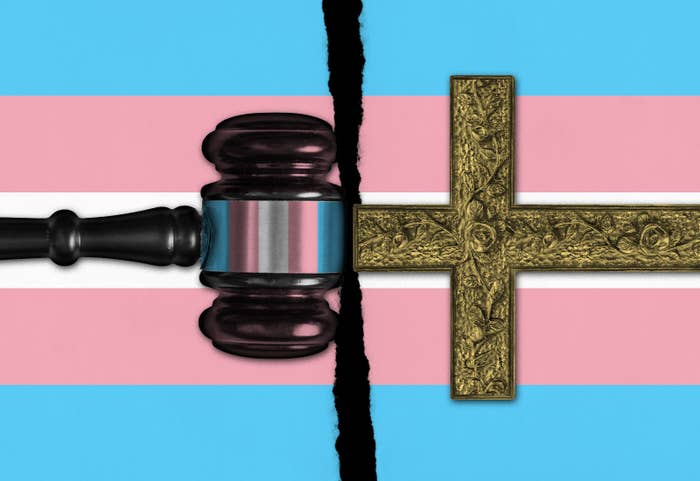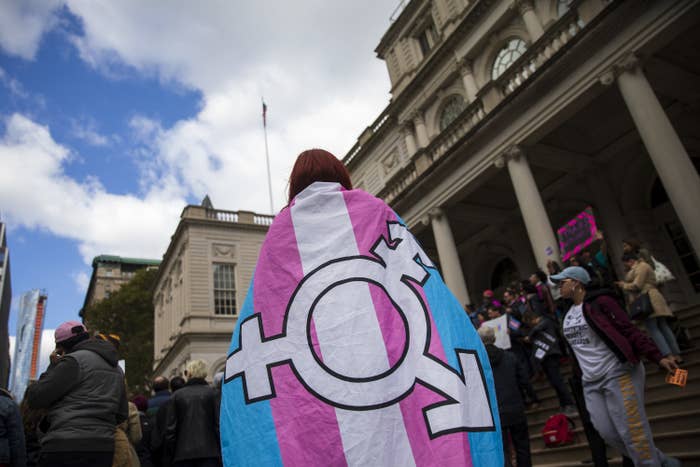LGBTQ activists may have already won the battle over what sex discrimination laws mean, but now they expect the Trump administration to weaken the laws with religious freedom exemptions.
Paul McLeod BuzzFeed News Reporter
Posted on June 24, 2020

BuzzFeed News / Getty Images
The Supreme Court gave LGBTQ activists a historic victory this month in the employment case of Bostock v. Clayton County, but it also may have set up the next major legal battle between civil rights and religious freedom.
The court decision came just days after the Trump administration determined that doctors, hospitals, insurers, and other health providers could deny services to trans people. That move came when the Department of Health and Human Services defined the Affordable Care Act’s ban on discrimination on the basis of sex to not include gender identity, meaning trans people are not protected.
In Bostock, the Supreme Court ruled the exact opposite — that sex discrimination includes gender identity — in the most sweeping decision to protect LGBTQ people in the court’s history.
But it’s what is not included in the decision — the question of how broadly the Trump administration can extend religious exemptions to cut away at antidiscrimination laws — that lawyers expect to be the next major battlefield in LGBTQ rights.
The Trump administration could essentially say that even if refusing service to a trans person is sex discrimination, businesses or health providers could be protected if providing a service violates their religious beliefs.
“The real battleground here is going to be religious freedom attempts,” said Kristen Prata Browde, who sits on the board of the National Trans Bar Association. “People are going to be using religious exemptions as a way (to get around discrimination).”
ADVERTISEMENT
On Monday morning, a coalition of legal groups and health clinics sued the Trump administration in the US District Court for the District of Columbia to reverse the sex discrimination rule change.
The Religious Freedom Restoration Act of 1993, known as RFRA, allows for exemptions to antidiscrimination laws. It prohibits the federal government from substantially burdening a person’s exercise of religion unless it furthers a compelling government interest and is the least restrictive way of doing so.
The Supreme Court nodded at this question but did not resolve it. The Bostock opinion, authored by Neil Gorsuch, said only that RFRA “might” be able to be used to carve out religious exemptions. “Because RFRA operates as a kind of super statute, displacing the normal operation of other federal laws, it might supersede Title VII’s commands in appropriate cases,” the opinion said.
Omar Gonzalez-Pagan of Lambda Legal said the Bostock decision will be a huge help to his group and others in legal cases to extend LGBTQ rights across the country because courts look to similar statutes when it comes to questions of interpretation. Lambda is one of the groups suing over the ACA rule change.
Gonzalez-Pagan described Trump’s healthcare rule change as “eviscerated” by the decision. He said he now expects the administration to react by pushing for sex descrimination exemptions on religious grounds.
“It’s certainly something that they will attempt,” he said. “They will now try to limit it, to carve it out as much as possible.”

Drew Angerer / Getty Images
LGBTQ activists and supporters rally in support of transgender people on the steps of New York City Hall, Oct. 24, 2018.
ADVERTISEMENT
The Supreme Court case and the Trump administration rule change are not directly linked. The rule change redefines the wording of the Affordable Care Act, while the Supreme Court case involved Title VII of the Civil Rights Act of 1964 pertaining to employment law.
But given the obvious similarities, advocates say they will be citing the Supreme Court ruling in fighting the rule change along with dozens, if not hundreds, of legal cases across the country.
“They might as well change it now because if they don’t, we’re coming for them,” said Prata Browde.
Defenders of the ACA rule change argue that the context is different and that it should not be affected by an unrelated Supreme Court decision.
“Unlike Title VII, which only covers employment, Section 1557 of the Affordable Care Act and its implementing rule covers a large number of contexts,” said Gregory Baylor, senior counsel for the Alliance Defending Freedom. “There will almost certainly be litigation over (the rule change), but it is less clear how those disputes will turn out.”
But it is not just progressives who say the Supreme Court ruling will have an impact. In his scathing dissent on Bostock, Supreme Court Justice Samuel Alito warned the “gravitational pull” of the ruling is “virtually certain to have far-reaching consequences.”
ADVERTISEMENT
He speculated the ruling will be cited in legal cases ranging from healthcare to professional sports. “Today’s decision may have effects that extend well beyond the domain of federal antidiscrimination statutes,” Alito wrote.
Alito included an appendix of well over 100 federal statutes that contain anti–sex descrimination provisions that could be called into question.
The upshot is that while the battle lines will likely change, the legal fights between the Trump administration and LGBTQ groups have no end in sight.

Paul McLeod is a politics reporter for BuzzFeed News and is based in Washington, DC.
Contact Paul McLeod at paul.mcleod@buzzfeed.com.
Got a confidential tip? Submit it here.
No comments:
Post a Comment